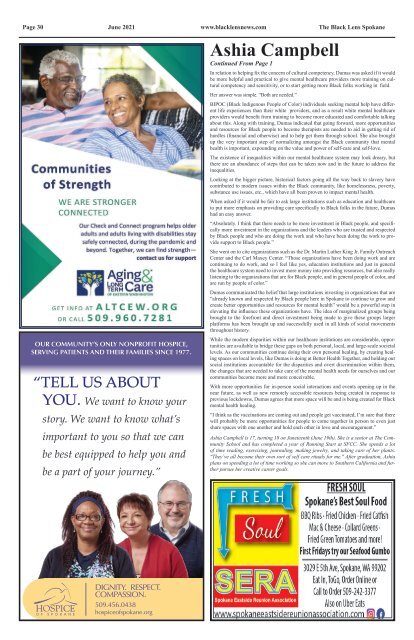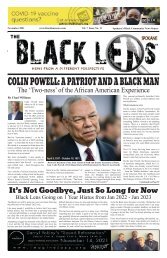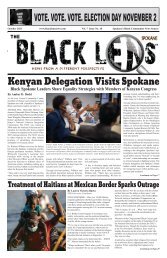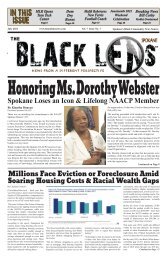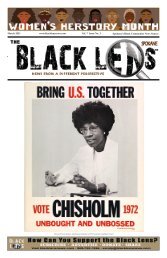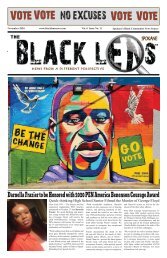Black Lens June 2021
The Black Lens is an independent, monthly, community newspaper based in Spokane, WA, that is focused on the news, information, people and events that are of importance of the Black community.
The Black Lens is an independent, monthly, community newspaper based in Spokane, WA, that is focused on the news, information, people and events that are of importance of the Black community.
Create successful ePaper yourself
Turn your PDF publications into a flip-book with our unique Google optimized e-Paper software.
Page 30<br />
<strong>June</strong> <strong>2021</strong><br />
www.blacklensnews.com<br />
The <strong>Black</strong> <strong>Lens</strong> Spokane<br />
OUR COMMUNITY’S ONLY NONPROFIT HOSPICE,<br />
SERVING PATIENTS AND THEIR FAMILIES SINCE 1977.<br />
“TELL US ABOUT<br />
YOU. We want to know your<br />
story. We want to know what’s<br />
important to you so that we can<br />
be best equipped to help you and<br />
be a part of your journey.”<br />
Ashia Campbell<br />
Continued From Page 1<br />
In relation to helping fix the concern of cultural competency, Dumas was asked if it would<br />
be more helpful and practical to give mental healthcare providers more training on cultural<br />
competency and sensitivity, or to start getting more <strong>Black</strong> folks working in field.<br />
Her answer was simple. “Both are needed.”<br />
BIPOC (<strong>Black</strong> Indigenous People of Color) individuals seeking mental help have different<br />
life experiences than their white providers, and as a result white mental healthcare<br />
providers would benefit from training to become more educated and comfortable talking<br />
about this. Along with training, Dumas indicated that going forward, more opportunities<br />
and resources for <strong>Black</strong> people to become therapists are needed to aid in getting rid of<br />
hurdles (financial and otherwise) and to help get them through school. She also brought<br />
up the very important step of normalizing amongst the <strong>Black</strong> community that mental<br />
health is important, expounding on the value and power of self-care and self-love.<br />
The existence of inequalities within our mental healthcare system may look dreary, but<br />
there are an abundance of steps that can be taken now and in the future to address the<br />
inequalities.<br />
Looking at the bigger picture, historical factors going all the way back to slavery have<br />
contributed to modern issues within the <strong>Black</strong> community, like homelessness, poverty,<br />
substance use issues, etc., which have all been proven to impact mental health.<br />
When asked if it would be fair to ask large institutions such as education and healthcare<br />
to put more emphasis on providing care specifically to <strong>Black</strong> folks in the future, Dumas<br />
had an easy answer.<br />
“Absolutely. I think that there needs to be more investment in <strong>Black</strong> people, and specifically<br />
more investment in the organizations and the leaders who are trusted and respected<br />
by <strong>Black</strong> people and who are doing the work and who have been doing the work to provide<br />
support to <strong>Black</strong> people.”<br />
She went on to cite organizations such as the Dr. Martin Luther King Jr. Family Outreach<br />
Center and the Carl Maxey Center. “Those organizations have been doing work and are<br />
continuing to do work, and so I feel like yes, education institutions and just in general<br />
the healthcare system need to invest more money into providing resources, but also really<br />
listening to the organizations that are for <strong>Black</strong> people, and in general people of color, and<br />
are run by people of color.”<br />
Dumas communicated the belief that large institutions investing in organizations that are<br />
“already known and respected by <strong>Black</strong> people here in Spokane to continue to grow and<br />
create better opportunities and resources for mental health” would be a powerful step in<br />
elevating the influence these organizations have. The idea of marginalized groups being<br />
brought to the forefront and direct investment being made to give these groups larger<br />
platforms has been brought up and successfully used in all kinds of social movements<br />
throughout history.<br />
While the modern disparities within our healthcare institutions are considerable, opportunities<br />
are available to bridge these gaps on both personal, local, and large-scale societal<br />
levels. As our communities continue doing their own personal healing, by creating healing<br />
spaces on local levels, like Dumas is doing at Better Health Together, and holding our<br />
social institutions accountable for the disparities and overt discrimination within them,<br />
the changes that are needed to take care of the mental health needs for ourselves and our<br />
communities become more and more conceivable.<br />
With more opportunities for in-person social interactions and events opening up in the<br />
near future, as well as new remotely accessible resources being created in response to<br />
previous lockdowns, Dumas agrees that more space will be and is being created for <strong>Black</strong><br />
mental health healing.<br />
“I think as the vaccinations are coming out and people get vaccinated, I’m sure that there<br />
will probably be more opportunities for people to come together in person to even just<br />
share spaces with one another and hold each other in love and encouragement.”<br />
Ashia Campbell is 17, turning 18 on <strong>June</strong>teenth (<strong>June</strong> 19th). She is a senior at The Community<br />
School and has completed a year of Running Start at SFCC. She spends a lot<br />
of time reading, exercising, journaling, making jewelry, and taking care of her plants.<br />
"They’ve all become their own sort of self care rituals for me." After graduation, Ashia<br />
plans on spending a lot of time working so she can move to Southern California and further<br />
pursue her creative career goals.<br />
DIGNITY. RESPECT.<br />
COMPASSION.<br />
509.456.0438<br />
hospiceofspokane.org


